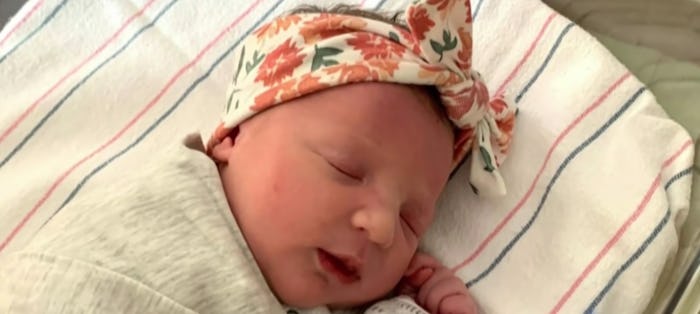Health
Couple Welcomes Baby Born From An Embryo Frozen 27 Years Ago
A baby born in Tennessee is believed to have set a new known record for being the longest frozen embryo to result in a birth.
At just over one month old, Molly Gibson has no idea she's a record-breaker. Nor does she know her birth was 27 years in the making. This petite baby was born from a 27-year-old embryo, meaning her parents — Tina and Ben Gibson — now hold the record for the longest known frozen embryo to result in a birth. But while Molly may be new to setting records, it's something her parents are already familiar with as they are likely to have set the previous record for the longest frozen embryo to result in birth with their first child.
"With Emma, we were just so smitten to have a baby," Tina told CNN of her first child, a daughter born in 2017 from an embryo frozen 24 years before. "With Molly, we're the same way. It's just kind of funny — here we go again with another world record."
After struggling with infertility for years, the Gibsons turned to embryo adoption. In 2017, they adopted Emma's embryo, which had been frozen in 1992, from the National Embryo Donation Center, a non-profit embryo donation organization based in Knoxville, Tennessee. At the time of her birth, Emma was believed, but not confirmed, to have been the longest-frozen embryo to result in birth, NBC News reported.
Three years later, the Gibsons returned to the National Embryo Donation Center in February to adopt Molly's embryo, which like her sister's was frozen in 1992, according to CNN. In late October, 27 years after Molly was first conceived and frozen as an embryo, Tina gave birth to her.
While their daughters perceived status as record holders certainly make them unique, the Gibsons are simply happy to have them in their lives — records or not. "We're over the moon," Tina told the BBC. "I still get choked up. If you would have asked me five years ago if I would have not just one girl, but two, I would have said you were crazy."
According to the BBC, the Gibsons first heard about embryo adoption after Tina's mother saw a story about the process on the news. They've since shared their own experiences with embryo adoption in hopes it helps other hopeful parents learn more about the various options available to them. "That's the only reason that we share our story," Tina told the BBC. "If my parents hadn't seen this on the news then we wouldn't be here. I feel like it should come full-circle."
While embryo adoption isn't guaranteed to be successful — roughly 75% of embryos survive thawing and transfer with 25 to 30% of implanted embryos go on to result in successful births, according to CNN — National Embryo Donation Center President Dr. Jeffrey Keenan maintains it is a great option. “Embryo adoption is a fantastic option for so many couples,” Kennan told NBC. “It's an exceptionally successful and very cost-effective option, and it's sometimes really the only option for couples where the mother can actually experience a pregnancy and the birth of a child.”
